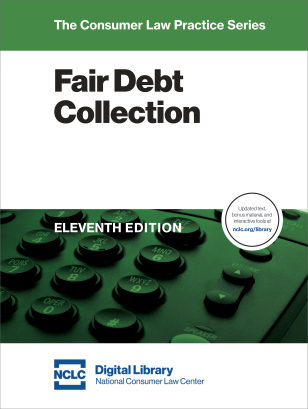Fair Debt Collection Practices Act (FDCPA) litigation is one of the most active consumer law areas today. So far in 2017, the Supreme Court has heard oral arguments in two FDCPA cases and the Circuit Courts of Appeal have already issued eight decisions, all summarized below, with links to NCLC’s Fair Debt Collection for more details on the issues ruled on in these cases.
Supreme Court Hears Oral Argument on Debt Buyer Coverage
Henson v. Santander Consumer USA, Inc., 817 F.3d 131 (4th Cir. 2016), cert. granted, No. 16-349, 2017 WL 125669 (U.S. Jan. 13, 2017), and oral argument held before all nine justices on April 18 2017. Santander purchased $3.55 billion in loan receivables from CitiFinancial Auto. This portfolio included deficiency balances for putative class members after they defaulted on auto loans and CitiFinancial Auto repossessed their vehicles.
The FDCPA defines debt collector as any business whose “principal purpose . . . is the collection of any debts” or who “regularly collects . . . debts owed or due . . . another.” The FDCPA applies if a collector meets either test.
The Fourth Circuit held that Santander was collecting on its own debt -- not debts “owed or due another” -- and therefore did not qualify as a debt collector under 1692a(6). That ruling is now before the Supreme Court. The principal purpose test was not at issue in this case. For more on who is a debt collector under the FDCPA, see Fair Debt Collection § 4.2.
Supreme Court Hears Oral Argument on Proofs of Claim for Time-Barred Debt
Johnson v. Midland Funding, L.L.C., 823 F.3d 1334 (11th Cir. 2016), cert granted sub nom Midland Funding, L.L.C. v. Johnson, 137 S. Ct. 326 (2016), and oral argument held before eight justices on January 17, 2017. At issue was a debt buyer filing of proof of claims in bankruptcy proceedings for debts that were past the statute of limitations. The Eleventh Circuit concluded that the Bankruptcy Code does not preclude claims under the FDCPA and that debt collectors who file proofs of claims on time-barred debt may be liable for violations of FDCPA §§ 1692e or 1692f. For a detailed analysis of the interrelation of the Bankruptcy Code and the FDCPA, see Id. § 8.11.
Application of FDCPA Requirements to Home Foreclosures, Debts Owed to Homeowner Associations
Carlin v. Davidson Fink L.L.P., __ F.3d __, 2017 WL 1160887 (2d Cir. Mar. 29, 2017) deals with what communication in the foreclosures context constitutes an initial communication about a debt that requires certain FDCPA disclosures. A notice about the debt that was attached to a mortgage foreclosure complaint, was not an initial communication under FDCPA §1692g(a) requiring certain disclosures, because §1692g(d) specifically excludes “communication in the form of a formal pleading in a civil action.” The court held that this broad exclusion was intended to cover all exhibits attached to a complaint. Next, the court held that a dispute letter from the plaintiff to the defendant that was prompted by the notice attached to the foreclosure complaint was not an initial communication. Finally, the court concluded that Plaintiff adequately alleged a violation of §1692g(a) for the letter sent by the Defendant to the Plaintiff in response to the dispute letter. The court concluded that this was an initial communication that was sent in connection with the collection of any debt and that the letter did not clearly state the amount of the debt because it stated that the total amount due “may include estimated fees and costs.” For more on notice requirements after initiating debt collection with formal pleadings, see Id. § 5.7.2.5.2.
Dowers v. Nationstar Mortg., L.L.C., __ F.3d __, 2017 WL 1192207 (9th Cir. Mar. 31, 2017) deals with the question whether various FDCPA requirements apply to efforts to enforce a deed of trust. Citing Ho v. ReconTrust Co., 840 F.3d 618 (9th Cir. 2016), the court affirmed the dismissal of plaintiffs’ claims under §§ 1692c(a)(2), 1692d, and 1692e, concluding that efforts to enforce a Nevada deed of trust were not “debt collection” under §1692a(6) because there was no attempt to collect a money debt. See generally Id. § 4.3.11. In a footnote, the court noted that Nevada law would have prohibited defendant from obtaining a deficiency judgment against Plaintiffs in a non-judicial foreclosure on the property. Plaintiffs stated a claim under §1692f(6) when they alleged that Defendant threatened to use non-judicial foreclosure to take their home without legal authority to do so.
Mains v. Citibank, __ F.3d __, 2017 WL 1160901 (7th Cir. Mar. 29, 2017). The Rooker-Feldman doctrine barred the homeowner’s claim that defendants violated the FDCPA by trying to collect a debt that no longer existed due to the rescission of the homeowner’s mortgage. See Id. § 7.4.4. Defendants were attempting to collect a debt authorized by the state foreclosure judgment. Issue preclusion barred plaintiff’s allegations that defendants violated the FDCPA prior to the state court judgment by attempting to collect on a debt they knew to be invalid using defective and falsified documents.
Heng v. Heavner, Beyers & Mihlar, L.L.C., __ F.3d __, 2017 WL 655433 (7th Cir. Feb. 17, 2017). Affirming dismissal of three consolidated cases, the court found that homeowners with FHA mortgages failed to state a claim that foreclosure law firms made misleading statements and threatened to take actions that cannot be taken (in violation of §§ 1692e and 1692e(5)) by seeking deficiency judgments against the homeowners. See generally Id. § 5.5.2. The Seventh Circuit concluded that the homeowners failed to identify any law requiring a mortgagee to obtain FHA approval before seeking a deficiency judgment in state court on FHA mortgages.
Mashiri v. Epsten Grinnell & Howell, 845 F.3d 984 (9th Cir. 2017) deals with the FDCPA’s application to collection of debts owed to a homeowner’s association. The Ninth Circuit found that an overdue assessment to a homeowner’s association was a debt and a law firm attempting to collect it was a debt collector. Defendant did not qualify as an entity engaged solely in the enforcement of a security interest (and thus exempt from most FDCPA provisions) because no lien had yet been recorded against plaintiff’s property. See Id. § 4.3.11. Plaintiff plausibly alleged two claims under 1692g having to do with validation of debts. First, the collection letter demanding payment within 35 days of the date of the letter was inconsistent with plaintiff’s right to dispute the debt within 30 days of receipt of the letter because fewer than thirty days may exist to make a payment by the time the letter is received. Second, the defendant threatened to file a lien if payment was not received within 35 days of the date of the letter without explaining that this collection activity would cease if the plaintiff disputed the debt. This language overshadowed plaintiff’s right to dispute the debt. See generally Id. § 5.7.
Collector Failing to Disclose Debt Was Time-Barred
Pantoja v. Portfolio Recovery Assocs., L.L.C., __ F.3d __, 2017 WL 1160902 (7th Cir. Mar. 29, 2017). Affirming summary judgment for the consumer’s §1692e claim against Defendant for offering to settle a time-barred debt without disclosing that 1) making a partial payment or even promising to make a partial payment could restart the statute of limitations on a 20 year old debt and 2) that Defendant was legally prohibited from suing on the debt. The court concluded that an unsophisticated consumer might reasonably read defendant’s statement that “[b]ecause of the age of your debt, we will not sue you” to mean that the defendant was simply choosing not to sue. See generally Id. § 5.5.2.13.3.
Pre-Judgment Interest
Aker v. Americollect, Inc., __ F.3d __, 2017 WL 1352089 (7th Cir. Apr. 13, 2017). Defendant did not misrepresent the amount of a debt (§ 1692e(2)(A)) or violate the FDCPA’s verification requirements when it added 5% statutory interest to a debt without first obtaining a judgment. The court held that, under Wisconsin law, statutory interest either runs automatically or the Defendant’s practices of adding statutory interest was subject to the state statute’s safe harbor provision. The state’s safe harbor provision was not preempted by FDCPA §1692n preempting inconsistent state laws, because § 1692n addresses state law regulating debt collection practices, not state law determining the amount of the debt owed. See Id. § 6.12.1.
FDCPA Class Action Settlements
Koby v. ARS Nat’l Serv., Inc., 846 F.3d 1071 (9th Cir. 2017). In a case alleging that ARS left voice messages without revealing its identity (in violation of FDCPA § 1692d(6)) and that it was collecting a debt (in violation of § 1692e(11)), the court found that the magistrate judge abused her discretion in approving a nationwide class action settlement. In a case involving 4 million consumers, the settlement consisted of $1,000 to each of the three named plaintiffs, $67,500 in attorney’s fees, a $35,000 cy pres award to a San Diego charity for veterans, and a stipulated injunction in which ARS agreed to change its voicemail policy for two years. The court found that the injunctive relief was worthless to most class members because ARS might not contact these class members again in the future, ARS had already voluntarily adopted the voicemail message prior to the settlement, and the injunction contained an “escape clause” that allowed the ARS to resume its prior conduct if there was a change in the law. The court also found no evidence that the nationwide class would benefit from the cy pres award to a regional recipient that did not even work on issues related to unfair debt collection practices. The court also found that the settlement inappropriately required class members to give up something of value – their right to pursue damages claims against the defendant as part of a class action – without getting anything of value in return. For more on FDCPA class action settlements, see Id. § 6.6.5.


